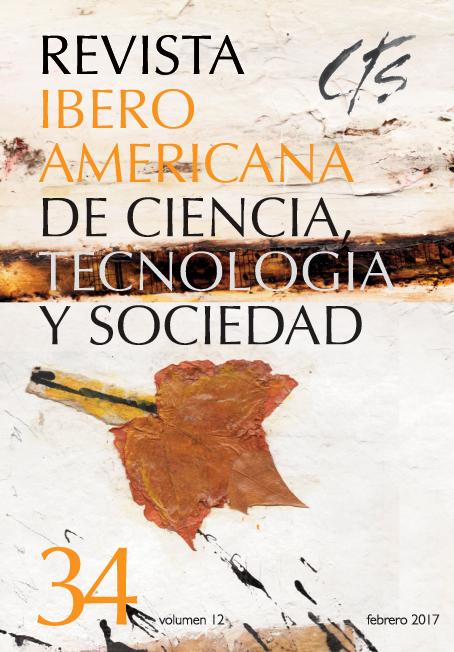Social Sciences Measured By ICT
Keywords:
society, culture, social knowledge, information and communications technologiesAbstract
Information and Communications Technologies (ICT) have decisively and relentlessly become a part of the social world, upheaving everyday cultural landmarks. This process has brought new meanings to certain regulations in social interaction and exchange, expressing itself in new, temporary and even potentially renewable ways with and vis-à-vis ICT. Consequently, this situation poses new challenges for the traditional methods in the production and implementation of social knowledge. The goal is to propose a methodological perspective that will identify the main cognitive challenges associated with social knowledge –taken as an area in constant transformation-, in order to evaluate the new social interaction and exchange processes driven by the technological intervention.Downloads
References
ARDÈVOL, E. y LANZENI D. (2014): “Visualidades y materialidades de lo digital: caminos desde la antropología”, Revista Anthropologica, vol. 32, n° 33, pp. 11-38.
BUSTOS, E. y FELTRERO R: (2005): “Internet y el acceso al conocimiento. La articulación de lo epistemológico y lo moral”. Disponible en: http://www.uned.es/dpto_log/ebustos/docs/InternetAcceso.pdf. Consultado el 6 de febrero de 2015.
BOUZA, F. (2002): “Innovación tecnológica y cambio social”, en V. Pérez y B. Fernández (coords.): Las encrucijadas del cambio social, Universidad de Vigo yCentro de Investigaciones Sociológicas, pp. 85?97. Disponible en: https://www.ucm.es/data/cont/docs/471-2013-11-05-innova.pdf. Consultado el 4 de febrero de 2015.
BRUNNER, J. J. (1988): El espejo trizado: ensayo sobre cultura y políticas culturales, Santiago, FLACSO.
BOURDIEU, P. (1994): “El campo científico”, Redes: Revista de estudios sociales de la ciencia, vol. 1, n° 2, pp. 131-159
CASTELLS, M. (2012): “El poder en la era de las redes sociales”, Nexos, n° 417, pp. 44-51. Disponible en: http://www.nexos.com.mx/?p=14970. Consultado el 24 de mayo de 2015.
GARCÍA-CANCLINI, N. (1990): Culturas híbridas: estrategias para entrar y salir de la modernidad, México, Grijalbo.
GIDDENS, A. (1999): Un mundo desbocado. Los efectos de la globalización en nuestras vidas, México, Taurus.
GIDDENS, A. (2001): En defensa de la sociología, Madrid, Alianza Editorial.
GARCÍA, J. (2005): “Intersubjetividad y saber: El papel de los intercambios y la toma de perspectiva del otro”, Revista de Filosofía de la Universidad de Costa Rica, vol. 43, n° 109-110, pp. 11-19.
GIMÉNEZ, G. (2002): “Territorio, cultura e identidades. La región socio-cultural”, en R. Rosales (coord.): Globalización y regiones en México, México, Miguel Ángel Porrúa/UNAM, pp. 19-51.
GIMÉNEZ, G. (2002): “Globalización y cultura”, Revista Estudios Sociológicos, vol. 20, no. 1, pp. 23-46.
GUIAMET, J. y SACCONE, M. (2015): “La cocina de la investigación: algunas consideraciones teórico-metodológicas sobre el “enfoque socio-antropológico”, Revista Sociológica de pensamiento Crítico, vol. 9, n° 1, pp. 81-92. Disponible en: http://www.intersticios.es/article/view/13993. Consultado el 17 de marzo de 2015.
HOPENHAYN, M. (2004): “Orden Mediático y Orden Cultural: Una ecuación en busca de Resolución”, Pensar Iberoamérica, n° 5. Disponible en: http://www.oei.es/pensariberoamerica/ric05a02.htm. Consultado el 10 de febrero de 2015.
LÉVY, P. (1999): “Cibercultura y educación”, La Universidad en la Sociedad de la Información. Documentos Columbus sobre Gestión universitaria, París, CREColumbus-UNESCO.
MALDONADO, C. E. (2014): “¿Qué es eso de pedagogía y educación en
modernidad?”, Intersticios sociales, n° 7, pp. 3-23. Disponible en: http://www.intersticiossociales.com/ediciones/numero_7.html. Consultado el 9 de febrero de 2015.
NOIRET, S. (2011): “Y a-t-il une histoire numérique 2.0?”, en J. P. Genet y A. Zorzi (eds.): Les Historiens et l’informatique. Un métier à réinventer, Roma, École française de Rome, pp. 235-288. Disponible en: http://cadmus.eui.eu/bitstream/handle/1814/18074/Noiret_web-2-histoire-ecole-fran%C3%A7aise-2010.pdf. Consultado el 17 de
enero de 2015.
NÚÑEZ, J. (1999): La ciencia y la tecnología como procesos sociales. Lo que la educación científica no debería olvidar, La Habana, Editorial Félix Varela. Disponible en: http://www.inder.cu/indernet/provincias/hlg/documetos/textos/P%20S%20DE%20LA%20CIENCIA%20Y%20LA%20TECNOLOGIA/P%20S%20DE%20LA%20CIENCIA%20Y%20LA%20TECNOLOGIA.pdf. Consultado el 5 de febrero de 2015.
SENNETT, R. (2000): La corrosión del carácter. Las consecuencias personales del trabajo en el nuevo capitalismo, Barcelona, Anagrama.
VALDÉS, A. (2013): “Mirando al futuro: las ciencias sociales en un mundo
globalizado”, Disponible en: http://www.chapingo.mx/revistas/phpscript/download.php?file=completo&id=Nzg0. Consultado el 9 de febrero de 2015.
VILLE, S. (2001): L’imaginaire des nouvelles technologies, Rennes, Studio créatif de France Télécom R&D. Disponible en: http://pufr-editions.fr/livre/limaginaire-etrepr%C3%A9sentation-nouvelles-technologies-communication. Consultado el 4 de febrero de 2015.
Downloads
Published
How to Cite
Issue
Section
License
All CTS's issues and academic articles are under a CC-BY license.
Since 2007, CTS has provided open and free access to all its contents, including the complete archive of its quarterly edition and the different products presented in its electronic platform. This decision is based on the belief that offering free access to published materials helps to build a greater and better exchange of knowledge.
In turn, for the quarterly edition, CTS allows institutional and thematic repositories, as well as personal web pages, to self-archive articles in their post-print or editorial version, immediately after the publication of the final version of each issue and under the condition that a link to the original source will be incorporated into the self-archive.











